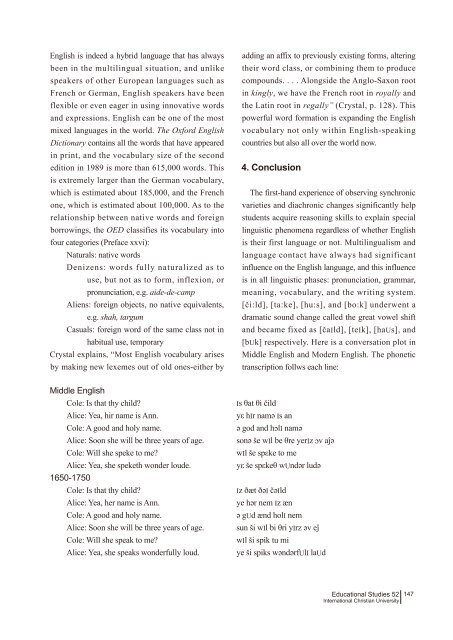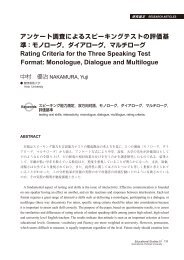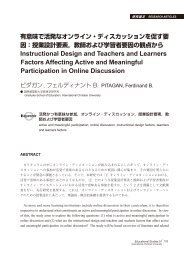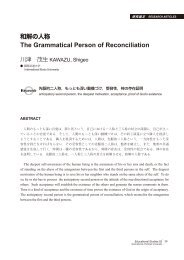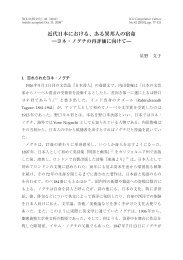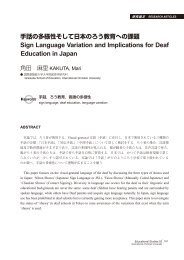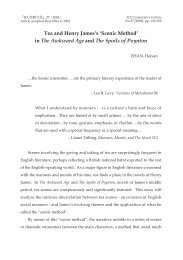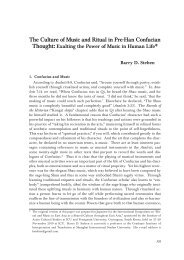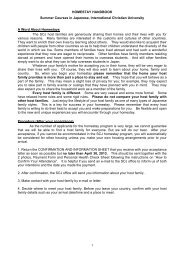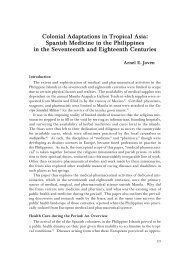Incorporating Multilingualism in the Development of the English ...
Incorporating Multilingualism in the Development of the English ...
Incorporating Multilingualism in the Development of the English ...
You also want an ePaper? Increase the reach of your titles
YUMPU automatically turns print PDFs into web optimized ePapers that Google loves.
<strong>English</strong> is <strong>in</strong>deed a hybrid language that has alwaysbeen <strong>in</strong> <strong>the</strong> multil<strong>in</strong>gual situation, and unlikespeakers <strong>of</strong> o<strong>the</strong>r European languages such asFrench or German, <strong>English</strong> speakers have beenflexible or even eager <strong>in</strong> us<strong>in</strong>g <strong>in</strong>novative wordsand expressions. <strong>English</strong> can be one <strong>of</strong> <strong>the</strong> mostmixed languages <strong>in</strong> <strong>the</strong> world. The Oxford <strong>English</strong>Dictionary conta<strong>in</strong>s all <strong>the</strong> words that have appeared<strong>in</strong> pr<strong>in</strong>t, and <strong>the</strong> vocabulary size <strong>of</strong> <strong>the</strong> secondedition <strong>in</strong> 1989 is more than 615,000 words. Thisis extremely larger than <strong>the</strong> German vocabulary,which is estimated about 185,000, and <strong>the</strong> Frenchone, which is estimated about 100,000. As to <strong>the</strong>relationship between native words and foreignborrow<strong>in</strong>gs, <strong>the</strong> OED classifies its vocabulary <strong>in</strong>t<strong>of</strong>our categories (Preface xxvi):Naturals: native wordsDenizens: words fully naturalized as touse, but not as to form, <strong>in</strong>flexion, orpronunciation, e.g. aide-de-campAliens: foreign objects, no native equivalents,e.g. shah, targumCasuals: foreign word <strong>of</strong> <strong>the</strong> same class not <strong>in</strong>habitual use, temporaryCrystal expla<strong>in</strong>s, “Most <strong>English</strong> vocabulary arisesby mak<strong>in</strong>g new lexemes out <strong>of</strong> old ones-ei<strong>the</strong>r byMiddle <strong>English</strong>Cole: Is that thy child?Alice: Yea, hir name is Ann.Cole: A good and holy name.Alice: Soon she will be three years <strong>of</strong> age.Cole: Will she speke to me?Alice: Yea, she speketh wonder loude.1650-1750Cole: Is that thy child?Alice: Yea, her name is Ann.Cole: A good and holy name.Alice: Soon she will be three years <strong>of</strong> age.Cole: Will she speak to me?Alice: Yea, she speaks wonderfully loud.add<strong>in</strong>g an affix to previously exist<strong>in</strong>g forms, alter<strong>in</strong>g<strong>the</strong>ir word class, or comb<strong>in</strong><strong>in</strong>g <strong>the</strong>m to producecompounds. . . . Alongside <strong>the</strong> Anglo-Saxon root<strong>in</strong> k<strong>in</strong>gly, we have <strong>the</strong> French root <strong>in</strong> royally and<strong>the</strong> Lat<strong>in</strong> root <strong>in</strong> regally” (Crystal, p. 128). Thispowerful word formation is expand<strong>in</strong>g <strong>the</strong> <strong>English</strong>vocabulary not only with<strong>in</strong> <strong>English</strong>-speak<strong>in</strong>gcountries but also all over <strong>the</strong> world now.4. ConclusionThe first-hand experience <strong>of</strong> observ<strong>in</strong>g synchronicvarieties and diachronic changes significantly helpstudents acquire reason<strong>in</strong>g skills to expla<strong>in</strong> speciall<strong>in</strong>guistic phenomena regardless <strong>of</strong> whe<strong>the</strong>r <strong>English</strong>is <strong>the</strong>ir first language or not. <strong>Multil<strong>in</strong>gualism</strong> andlanguage contact have always had significant<strong>in</strong>fluence on <strong>the</strong> <strong>English</strong> language, and this <strong>in</strong>fluenceis <strong>in</strong> all l<strong>in</strong>guistic phases: pronunciation, grammar,mean<strong>in</strong>g, vocabulary, and <strong>the</strong> writ<strong>in</strong>g system.[či:ld], [ta:ke], [hu:s], and [bo:k] underwent adramatic sound change called <strong>the</strong> great vowel shiftand became fixed as [čaIld], [teIk], [haUs], and[bUk] respectively. Here is a conversation plot <strong>in</strong>Middle <strong>English</strong> and Modern <strong>English</strong>. The phonetictranscription follws each l<strong>in</strong>e:Is θat θi čildyε hIr namə Is anə god and h lI naməcsonə še wIl be θre yerIzwIl še spεke to mecv aĵəyε še spεkeθ wUndər ludəIz ðæt ðəI čəIldye hər nem Iz ænə gUd ænd holI nemsun ši wIl bi θri yIrz əv eĵwIl ši spik tu miye ši spiks wəndərfUlI laUdEducational Studies 52International Christian University147


